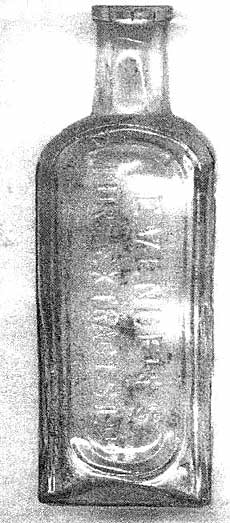Pink Pills for Pale People – and Other Elixirs

As we approach the season of colds and flu’ many of us will be visiting the village shop to buy medicines for our ailments in much the same way as the inhabitants of Walsham le Willows have done for many decades.
In the year 1791 an advertisement appeared in the Bury Post informing the public that ‘True Daffy’s Elixir’ was now available in Thomas Warne’s shop in the High Street of Walsham.
‘A most excellent and well-known and genuine medicine faithfully for up to sixty years. For the cure of stone, gravel, ulcerated kidney, the gout, rheumatism, cholic, dropsy, scurvy, surfeits, convultions, disorders peculiar to women, consumptions, the piles, fevers and the spitting of blood. An 8 oz. bottle for just 1s 6d.’ If, for some reason, this did not work, one could visit one of the chemists in Bury St. Edmunds where you could buy Ashton’s ‘never failing’ pills that cured ‘liver disorders, foul stomach, loss of appetite, trembling sensations, frightful dreams, disturbed sleep and impaired digestion and was the females’ greatest friend.’
Or there was Clarke’s ‘world-famed’ blood mixture that cured old sores, blackheads, ulcers, glandular swellings, impure blood and scurvy for only 2s 9d a bottle.
In February 1811 a letter from Walsham le Willows appeared in the Bury Post extolling Dr. Kent’s success in curing scrofula [a tubercular condition]: ‘After long continuance of my disease and the various means employed for my recovery without effect, could the speedy relief which I happily experienced from your incomparable medicines and applications sided by your judicious advice add anything to the celebrity of your name? I am now thirty-eight years of age and have been for upward of six years grievously afflicted with a scrophulous complaint on my nose and left leg. I would direct those who yet suffer under similar complaints to the only person who is likely to restore them to that health that I now enjoy and which, after many years of severe affliction, forms the felicity of my life – Elizabeth Frost’
A hundred years ago Beecham’s Pills were on sale in chemists then claiming to have the largest sale of patent medicines in the world. At one shilling ‘but worth a guinea’ they would, in twenty minutes, give relief to nervous disorders, wind and pain, sick headaches, giddiness, fullness and swelling after meals, flushings of heat, scurvy, frightful dreams, blotches on the skin and carry off all humours in females of all ages’
Dr. Simpson’s Herbal Pills, for one shilling, cured consumption and quickly stopped the spitting of blood and there was ‘a new medical work from London’ that cured ‘general weakness and depression, sleeplessness, fear, defective memory, confusion, trembling and nervous debility for those about to marry.’
Claiming that it had cured 27,066 people up to the end of December 1899, ‘Dr. William’s Pink Pills for Pale People’ were available for rheumatism, heart disease, anaemia, ladies ailments, and St. Vitus Dance – on special offer of 13s 6d for six boxes.
Finally there was Dr. Lalor’s Phosphodyne ‘for twenty-five years having a world-wide reputation for being ‘the only safe, reliable phosphoric remedy for the permanent cure of paralysis, sleeplessness, harassing dreams, consumption, heart disease, the premature decay of vital power and brain wreckage.’ At 4s 6d a bottle this could be the one for me, decay of vital power and brain wreckage – it sounds just the job.
James Turner
A Fatal Accident Through Drink
‘We have to record another melancholy accident through the intemperate use of intoxicating drink.’
It appears that a young man named Ambrose Bull in the service of Mr. Plummer of Walsham le Willows, was sent in company with a man named Foucard to Mellis station with two loads of corn. After disposing of their loads they went to a public house and had between them four quarts of beer and one quart of porter with rum in it. However much the deceased and his companion may be censured for drinking so much, the publican who supplied two men in charge of teams and wagons with five quarts of malt liquor, deserves censure. It may be a publican’s policy to sell all he can but, in this case, there was an evident want of care, to say the least of it, especially as the deceased was a mere lad only about 17 years of age.
An inquest was held at the Lion Inn, Mellis on Tuesday last, when the following evidence was adduced.
Henry Collins:
‘I am a farmer living at Mellis. I did not know the deceased. On Saturday last, about half-past two o’clock as I was digging my garden, I saw a wagon belonging to Mr. Plummer pass with three horses at full trot. Almost immediately after that, I saw Ambrose Bull with another wagon drawn by three horses out at full length. The deceased was standing on the shafts and had no reins. The horses were going at the rate of eight or nine miles an hour. I ran after them, intending to write to the men’s master and have them summoned. I was about fifty yards off when I saw the deceased lose hold of the wagon and fall upon his head in front of the wagon, which was empty. He had no reins. Both wheels passed over the lower part of his body; there was no one else in the wagon. Constable Ling was running and got to the deceased first and the deceased, when we took him up appeared to be dying. I procured a horse and tumbrel and conveyed the deceased to the Lion Inn. The first wagon was going very quickly and I think the deceased’s horses were anxious to over-take them. Mr. Lawson of Botesdale came up at the time.’
Police-constable Robert Ling:
‘I am stationed at Gislingham. On Saturday last, about half-past two o’clock in the afternoon, I was going in the direction of Mellis station and, when opposite to Mr. Morley’s I saw a wagon and three horses going as fast as they could. The man was riding on the shafts without reins. I called to him and he jumped down, stopping his horses to a walking pace. I saw a second wagon coming from the station, drawn by three horses at full length. The deceased was standing on the shafts and the horses were galloping. I called out “Where are your reins?” but he did not seem to take any notice of me. When he was turning the corner I saw him fall from the shafts, face foremost, and both wheels passed over his body. I helped to pick him up and found him insensible. The man with the first wagon stopped the horses. I cannot say whether the deceased was urging the horses on but he was evidently the worse for drink, as he was reeling about on the shafts. The man on the first wagon was tipsy.’
Mr. Plummer:
‘I am a farmer at Walsham le Willows. The deceased and the man Foucard who was with the first wagon, worked for me. I went to the Lion to see the deceased on Sunday morning. He was conscious and I asked him how the accident occurred. He replied that Foucard started off first at full trot. He put his horses in the wagon as quickly as he could and when he got into the road he jumped upon the shafts and his horses started off after the others. He tried to stop them and when they were going round Mr. Morley’s corner he felt frightened and fell. He told me they had four quarts of beer and one quart of porter with some rum in it. He was a very steady youth and I never saw him the least excited by drink.’
The jury returned a verdict of ‘Accidental death’. Foucard will be summoned for riding without reins.
Ambrose Bull was born in Walsham in 1849, the son of John and Mary Ann. The 1861 Census shows him living in Crownland Road with his parents, younger brothers William and George and sister Ellen. Their cottage stood beyond Crownland Hall and is now demolished.
A John Folkard, an agricultural labourer aged 45, lived next door. (1861 Census)
Mr. Plummer, their employer, was an unmarried farmer of 40 years. He farmed 175 acres and lived at Four Ashes Farm with a housekeeper and a servant. (1861 Census).

